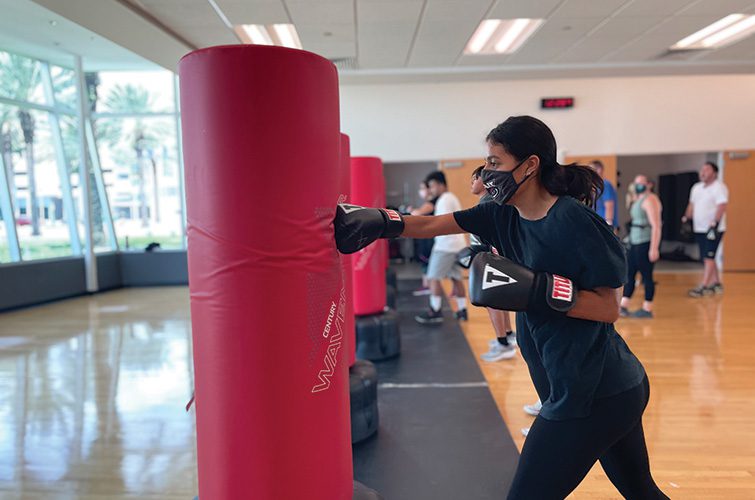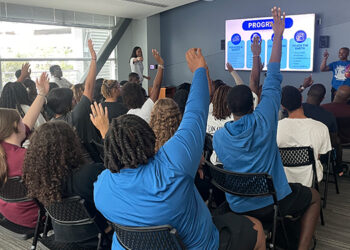Every January, New Year’s goals and resolutions are set, often accompanied by a sense of optimism and chance to reset. This is especially true for the three campus recreation teams. As such, they share 2022 outlooks, trend predictions and advice here.
2022 Outlook
At Florida Atlantic University (FAU), Jamie Flood, the interim associate director of Programs and Wellness Initiatives for Campus Recreation, shared they are most looking forward to safely continuing a return to in-person programming and exploring a variety of ways to reach non-traditional users.
“2022 looks to be a year of growth, development and training for not only our part-time staff, but our professional staff as well,” said Flood. “The COVID-19 pandemic has given us the opportunity to take a step back and reevaluate our staffing structure and hierarchy. We are excited to be implementing positive changes to specific roles within our personnel as we improve efficiency and stay current with industry standards.”
The staff of Virginia Tech Recreational Sports are also most looking forward to a year of more normal activities. With a heavily vaccinated population, Julie Rhoads, the assistant director for Sport Clubs, said more opportunities are available to their campus community.
EXTRA CREDIT: Six recreation directors share on what changed over the past year and where campus recreation is heading long-term.
“I’m most looking forward to giving students an opportunity to compete,” said Rhoads. “Since sport club activities were extremely limited, the student athletes have longed for the opportunity to play and compete again. The club experience is their outlet to shine and stay mentally and physically well.”
Echoing the FAU and Virginia Tech teams, Rick Hall, the director of Recreational Sports at Texas A&M University, said his team is most looking forward to seeing facilities full of:
- Students working out
- Rock climbing
- Swimming
- Playing intramural sports
- Participating in the rest of the activities offered
“We thrive on the energy in-person activities and events bring. We’re happy with the large uptick in the number of students who are participating thus far this academic year,” said Hall. “We certainly missed the personal connectivity we had with our students. We are building back our class sizes and intramural teams. We’re offering more outdoor experiences, and of course travel and competition opportunities for our sport club teams.”
Trend Predictions
At FAU, Flood emphasized fitness trends continue to follow the popularity of boutique fitness class offerings. For this reason, their fitness department has been working to develop intentional format-specific trainings. The hope is to increase student interest in becoming a cycle, HIIT/bootcamp, barre or kickboxing instructor. This will help FAU stay competitive in the industry.
“Overall, we’ve had a lot of success and better traction in these format-specific trainings versus a generalized group fitness instructor training course,” said Flood. “We plan to continue focusing on mirroring the industry by targeting specific format trainings and becoming the one-stop-shop for our community’s fitness needs.”
In terms of virtual services, FAU has seen a steady decline in participation since early in the pandemic. It has cut back virtual offerings to minimal throughout the week. They do plan to operate in a hybrid model indefinitely. Plus, they’ll increase marketing efforts and provide access to resources for online-only students.
The Virginia Tech team also plans to operate a hybrid model but is keeping many of its virtual offerings. These include:
- Strava Hokie Movement Club
- Virtual personal training
- Livestreaming all in-person group exercise workouts
They are also coordinating many outdoor-based activities including campus bike tours, outdoor fitness classes, trail run meet-ups and more.
EXTRA CREDIT: As a recap, here are the trend predictions from 2021.
Zak Worrell, the assistant director for Fitness at Virginia Tech, is also planning to launch F45 in the spring semester. One, he noted the growing boutique fitness trend. Two, the goal is to build community in small groups through fitness and recreation. “While the pandemic has influenced us to create new program offerings, we feel our students really want to be in-person and with others,” said Worrell.
For Hall at Texas A&M, on-demand fitness is a trend the team will continue to take advantage of. He noted the need to welcome change or get left behind. Plus, Hall said his team has fully embraced partnerships with health promotions and health services teams.
“These partnerships have enabled us to offer a wider range of programming and events, like our Run for Recovery 5K and Sober Yoga class we co-host in order to help promote National Recovery Month,” said Hall. “Within our department, we continue to increase collaborations across areas to offer new experiences that incorporate mindfulness, sleep and comprehensive wellness. A couple examples include mindfulness hikes and wellness coaching.”
EXTRA CREDIT: A look at the facility development trends in five specific areas.
Flood shared the FAU team also has collaboration high on their list. This is especially true with being members of the Healthy Campus 2030 committee. “This committee focuses on targeting specific health needs of our campus community by following the American College Health Association framework,” said Flood. “While a vital component of this committee is organizing our annual Healthy Campus Expo event each spring, we feel our on-going involvement in this committee is a much more valuable investment in our ability to combat the mental health crisis.”
And combatting the mental health crisis is still at the top of many rec department’s lists for 2022. Will Trent, the assistant director for Marketing and Communications at Virginia Tech, shared their team has implemented events to leave a lasting impact on smaller groups throughout campus. “Happiness groups and gratitude groups meet weekly to study the science and benefits behind happiness and gratitude in people’s lives,” said Trent. “Meditation sessions are offered on Sunday nights to help students set their best intentions for the week ahead. Going the extra mile to reach smaller groups is helping us create positive change in students’ lives one at a time.”
Optimistic Advice
At Texas A&M, Hall shared several members of the team are reading and discussing the book, “Five Languages of Appreciation in the Workplace,” by Gary Chapman and Paul White, which offers insight into how to be more mindful of colleague’s needs, especially as they continue to adjust.
Trent shared in Matthew McConaughey’s book “Greenlights” he talks about being less impressed and more involved. “While it would be easy for us to look back and be impressed at how well we navigated the COVID-19 pandemic, it’s important for us to remain involved in doing the best we can to be the best,” he said.
Flood shared the FAU team is optimistic they won’t encounter this same scenario. However, they know they can do it again if necessary. “Our profession is uniquely prepared for these types of situations. We will always find a way to engage our campus communities in health and wellness programs and activities,” she said.
Images courtesy of FAU, Jackson Sirbaugh of Virginia Tech Rec Sports and Texas A&M.












